Far-right Twitter network targets Guatemala’s presidential election
Twitter network backed Guatemala’s Public Ministry amidst attempts to suspend political party Movimiento Semilla
Far-right Twitter network targets Guatemala’s presidential election
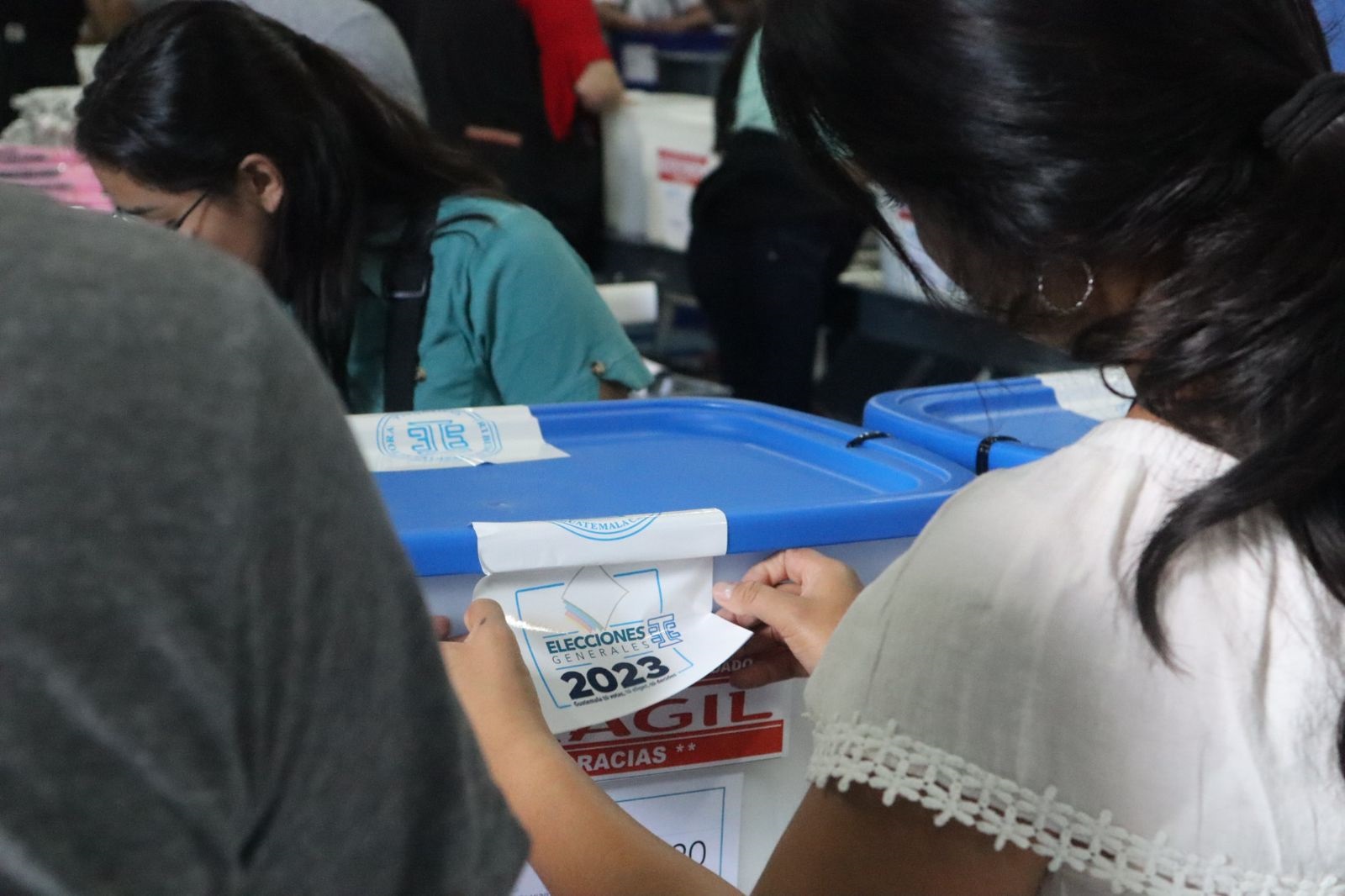
BANNER: Guatemala City, Guatemala.- In the photos taken on August 14, 2023, authorities are packing electoral materials and documents that will be used on August 20 for the second round. The elections will see a former first lady compete against the son of a former president. Unemployment, corruption and the high cost of living are on voters’ minds as they head to the polls on August 20. (Source: ULAN/Latin America News Agency via Reuters Connect)
In the wake of the first round of Guatemala’s 2023 presidential elections, a far-right Twitter retweet network linked to the Public Ministry of Guatemala targeted the presidential elections and Movimiento Semilla, one of the two political parties competing in the second round of the presidential runoff. The most influential accounts within this network include anonymous profiles, along with Guatemalan officials listed by the US Department of State for actions undermining democratic processes and perpetrating significant corruption.
In Guatemala, Twitter is not one of the most popular social media platforms. According to a report on social network usage in the country, there were over 650,000 Guatemalan Twitter users as of 2022. In contrast, Facebook had more than 8 million Guatemalan users. Even though Facebook continues to be the most popular platform and TikTok’s user base is seeing significant growth, Twitter remains a valuable source for real-time updates during pivotal events such as the presidential elections.
On June 25, 2023, Guatemala conducted the first round of its presidential elections. The results, announced by the TSE (Tribunal Superior Electoral, the Supreme Electoral Court) on July 12, confirmed that presidential candidates Sandra Julieta Torres Casanova, representing the political party Unidad Nacional de la Esperanza (“National Unity of Hope”), and Bernardo Arévalo De León, representing the political party Movimiento Semilla (“Seed Movement”), would participate in the decisive second round scheduled for August 20, 2023. TSE’s announcement came seventeen days after the first round, a delay necessitated by a recount demanded by a group of political parties alleging irregularities. These claims, however, were ultimately dismissed by the TSE.
On the same day that the TSE aimed to confirm the results, Freddy Orellana, a trial judge who typically oversees criminal cases, moved to suspend the political party Movimiento Semilla from participating in the decisive presidential runoff. This move was promoted by the Public Ministry of Guatemala, led by General Prosecutor Consuelo Porras. The action was executed by the Special Prosecutor’s Office against Impunity (Fiscalía Especial Contra la Impunidad – FECI), under the leadership of prosecutor Rafael Curruchiche.
The US Department of State listed both Rafael Curruchiche and Freddy Orellana, along with other officials from elsewhere in Central America, as foreign actors who have knowingly engaged in actions undermining democratic processes and significant corruption in Guatemala. Curruchiche was listed in the State Department’s 2022 report, while Orellana was included in its 2023 report due to “politically motivated criminal charges against journalists who were exercising their freedom of expression as protected by Guatemalan law.”
Guatemala’s electoral authority, however, overturned the Public Ministry’s suspension of Movimiento Semilla. According to TSE’s Citizen Registry office, the Electoral and Political Parties Law (Ley Electoral y de Partidos Políticos – LEPP) provides them with the sole authority to suspend or cancel any political organization, challenging the criminal judge’s authority to intervene in this matter. Moreover, according to this law, political parties cannot be suspended while an electoral process is in progress.
While TSE’s decision upheld the legitimacy of Movimiento Semilla’s participation in the second round of the electoral contest, thus preserving a crucial aspect of Guatemala’s democratic process, far-right narratives continue to undermine the integrity of the election. These narratives, particularly targeting Movimiento Semilla and Arévalo, not only lead to online harm but also foster distrust toward Guatemala’s democratic institutions.
The DFRLab identified signs of coordinated activity from Twitter accounts promoting these narratives, most involving anonymous profiles but also including former and current Guatemalan officials who are also on US State Department lists for actions undermining democratic processes or institutions and obstructing corruption inquiries.
Backing Guatemala’s Public Ministry on Twitter
To better analyze the activity of this network and its impact on the online information environment amidst the Guatemalan presidential elections, the DFRLab focused on the collection and analysis of retweets received by the Twitter account @MPguatemala, the official account for Guatemala’s Public Ministry.
According to data gathered through a search query using social listening tool Meltwater Explore, the research showed that, from June 1 to July 31, 2023, over 1,500 distinct profiles retweeted @MPguatemala more than 3,300 times. Approximately 20 percent of these retweets were concentrated on a single day, July 12, 2023. This was the same day when FECI attempted to suspend Movimiento Semilla.
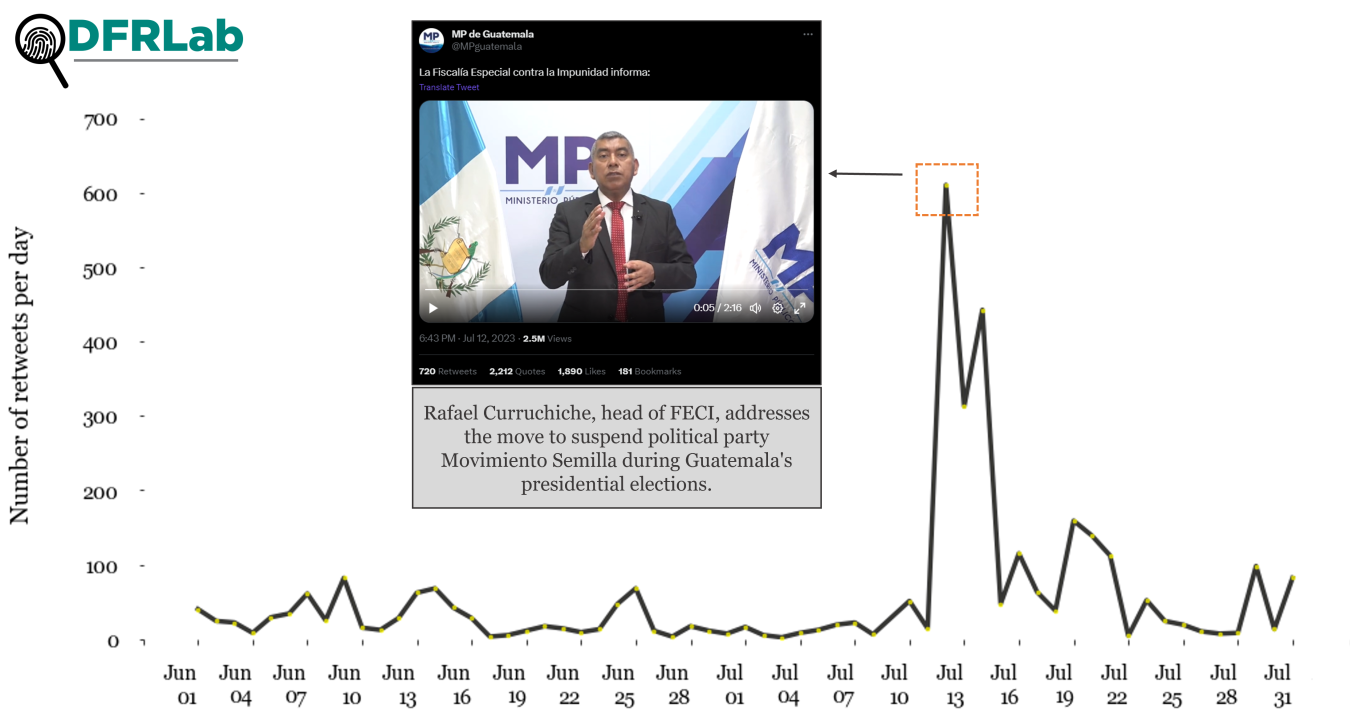
Utilizing social network analysis – a technique that visualizes and studies relationships among social interactions – the DFRLab identified Twitter profiles that were especially active in amplifying @Mpguatemala’s posts during the two-month period of analysis. These include anonymous Twitter accounts, as well as the account @RaulFalla31, which appears to be directly connected to Raul Falla, a lawyer for the far-right organization Foundation Against Terrorism (Fundación Contra el Terrorismo – FCT) in Guatemala. The US Department of State has flagged FCT for allegedly “obstructing criminal proceedings against former military officials implicated in acts of violence, harassment, or intimidation against corruption investigators.”
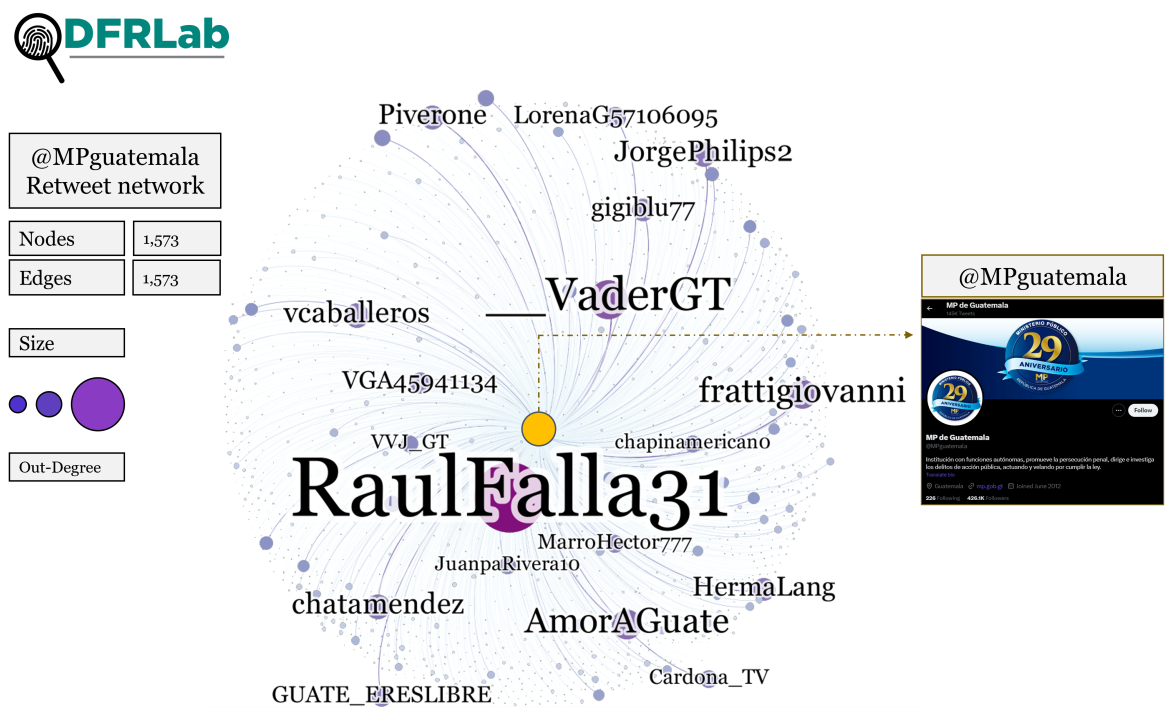
Among the anonymous Twitter accounts, the profile @__VaderGT, distinguished by a blue checkmark indicating an active subscription to Twitter Blue and therefore receiving paid-for prioritization in user feeds, was previously flagged by Guatemalan media as being associated with posts targeting human rights activists and as being part of a Guatemalan troll farm. Data analysis found that this account has served as a significant amplifier of @MPguatemala’s content and has similarly boosted messages from other Guatemalan far-right figures, such as @RaulFalla31.
Far-right connections through actors and content
Building on the retweet network of @MPguatemala, the DFRLab examined accounts frequently engaging with its content, specifically those that retweeted @MPguatemala at least ten times. This process led to a group of forty-nine unique accounts. To gain further insights into these accounts’ interactions on Twitter, we explored their retweet network, which revealed strong connections with far-right actors in Guatemala as well as key influential accounts acting as lead amplifiers across the network.
To identify the main actors in the network, the DFRLab measured the influence of accounts using the PageRank algorithm. In this context, this method highlights profiles not just based on the frequency of their retweets but also the significance of those retweeting them – meaning, how central or influential those retweeting accounts are within the network. We examined the retweets made by the forty-nine accounts to understand which accounts outside the network served as a source for frequently shared content from accounts within the network. By doing so, the research identified those accounts not in the network that have notable influence over the discussions and narratives taken up by our initial group of forty-nine accounts.
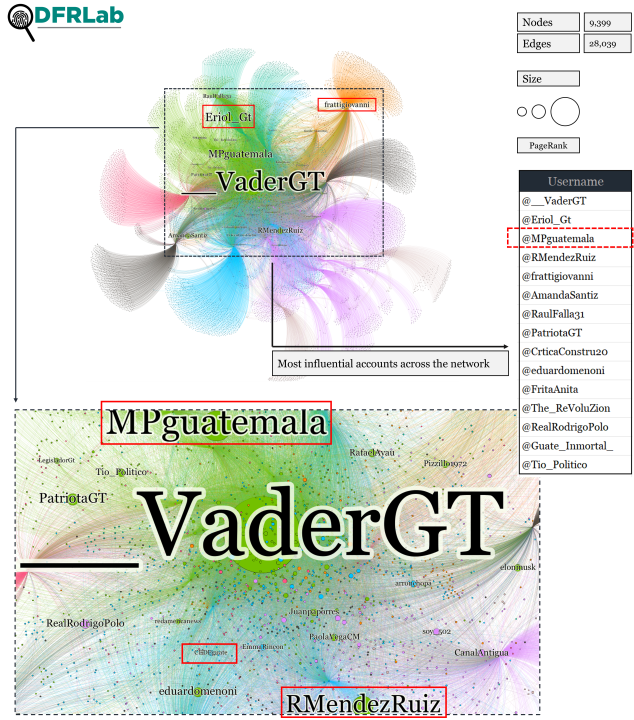
Among the most influential accounts across the network was @Eriol_Gt, an account also covered in previous investigations for engaging in coordinated activity targeting human rights activists alongside @__VaderGT. The account @MPguatemala was also one of the most retweeted accounts, confirming how these forty-nine profiles back Guatemala’s Public Ministry on Twitter. (While it might be assumed that the @Mpguatemala account would automatically be among the most retweeted, as was the actual case, it was possible that – despite being retweeted by the accounts in the network – it might not have been among the most retweeted.) Another account, @RMendezRuiz, associated with Ricardo Méndez Ruiz, a far-right figure in Guatemala, also ranked among the most retweeted accounts in this network.
Méndez Ruiz is the president of the Foundation Against Terrorism. Established in 2013, this nonprofit organization initially focused on defending military personnel accused of crimes during Guatemala’s nearly 40-year-long conflict. More recently, however, it has notably participated as a plaintiff in several judicial processes against officials who have investigated high-profile corruption cases involving top authorities and prominent business figures in the country. The US Department of State also included Méndez Ruiz on a list of foreign actors engaged in actions obstructing “criminal proceedings against former military officials who had committed acts of violence, harassment, or intimidation against governmental and nongovernmental corruption investigators.”
On Twitter, Méndez Ruiz has promoted content targeting Guatemalan figures who have exposed corruption within the country, including former judges, prosecutors, and journalist José Rubén Zamora, who has uncovered some of the most significant corruption cases in the country. Zamora has faced threats, attacks, and kidnappings for his investigations. He currently faces a six-year sentence after a contentious trial for alleged money laundering, a process he has publicly denounced as politically motivated. In the context of the elections, Méndez Ruiz has been using the same threat narrative against the TSE.
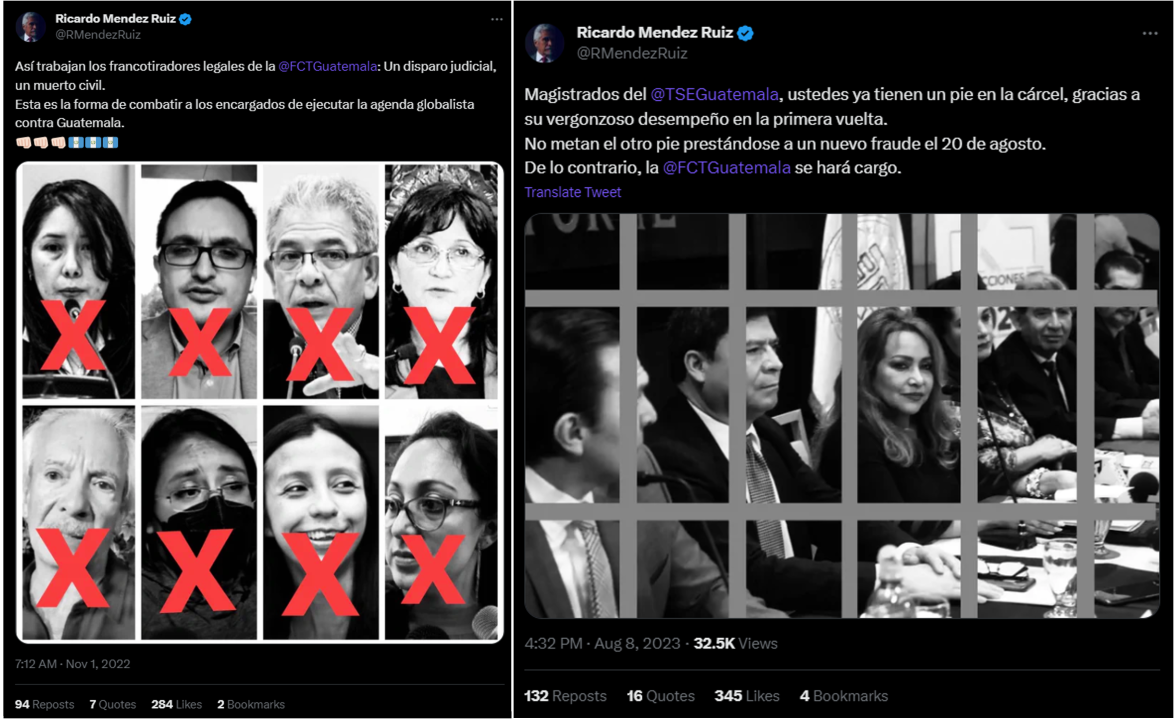
Similarly to @RMendezRuiz, another account that draws attention within the network is @CEDEguate. The account is associated with Omar Barrios Osorio, the current president of the board of directors of the National Port Commission. The US State Department flagged Barrios Osorio for actions that undermine democratic processes or institutions. Specifically, he has been accused of conspiring to intimidate and harass an anti-corruption prosecutor who denounced corrupt activity.
The accounts within this network predominantly amplified topics such as the Movimiento Semilla party and its presidential candidate, Bernardo Arévalo, as well as Guatemala’s TSE, FECI, and the TSE’s Citizen Registry office (CC). Additionally, the network also included references to US President Joe Biden and the United States (EEUU, by its Spanish acronym), as they often amplified pro-Trump narratives as well. The persistent focus on these topics, which frequently align with far-right narratives, suggests a coordinated pattern in the network’s discourse.
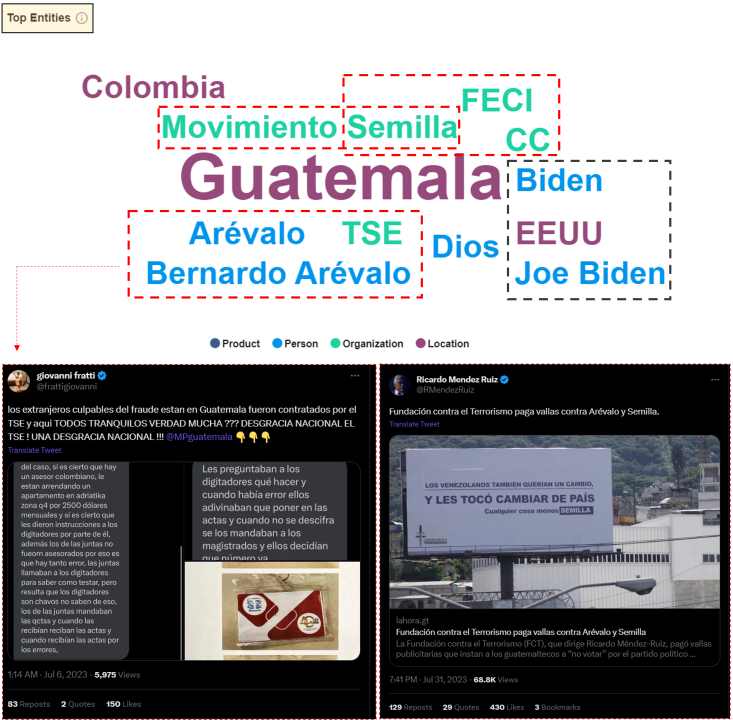
As Guatemala concludes its presidential elections, the role of electoral authorities in the country becomes crucial in safeguarding the integrity of the process. The DFRLab’s analysis indicated that certain Twitter accounts persistently push content and narratives in a coordinated manner. While some of the most influential accounts remain anonymous, the research found that such profiles play an important role in the analyzed network, amplifying actors who, despite being known for undermining democratic processes and engaging in corruption-related activities, continue to drive online narratives that threaten Guatemala’s democracy amidst the elections.
Cite this case study:
Esteban Ponce de León, “Far-right Twitter network targets Guatemala’s presidential election,” Digital Forensic Research Lab (DFRLab), August 17, 2023, https://dfrlab.org/2023/08/17/far-right-twitter-network-targets-guatemalas-presidential-election/.

